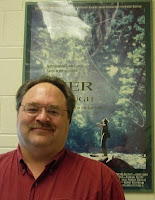 Author: Ferdinand de Saussure
Author: Ferdinand de Saussure
Born in Switzerland in 1857, Saussure received his doctorate from the University of Leipzig (Germany) in 1880 and taught at the University of Geneva from 1891 until his death in 1913 (he was only 56 at the time). Commonly referred to as "The Father of Modern
Linguistics," Saussure "provided the groundwork for both
structuralism and
poststructuralism.” (
Norton Anthology of Theory and Criticism, 959)
Text: Course in General Linguistics
Saussure's colleagues used notes taken by Saussure's students to produce this text, which was published in 1916, three years after Saussure's death.
A Taste (quotes from Saussure's
Course in General Linguistics reprinted in the
Norton Anthology of Theory and Criticism):
“. . . in language there are only differences. . . . [L]anguage has neither ideas nor sounds that existed before the linguistic system, but only conceptual and phonic differences that have issued from the system.
The idea or phonic substance that a sign contains is of less importance than the other signs that surround it. Proof of this is that the value of a term may be modified without either its meaning or its sound being affected, solely because a neighboring term has been modified.” (972-972)
“[L]anguage being what it is, we shall find nothing simple in it regardless of our approach; everywhere and always there is the same complex equilibrium of terms that mutually condition each other. Putting it another way,
language is a form and not a substance. This truth could not be overstressed, for all the mistakes in our terminology, all our incorrect ways of naming things that pertain to language, stem from the involuntary supposition that the linguistic phenomenon must have substance.” (974)
 Some Analysis:
Some Analysis:According to the
Norton Anthology of Theory and Criticism, “Saussure saw the study of language as eventually forming part of a larger science of signs in culture, which he called
semiology, a field that later scholars . . . went on to develop.” (958)
Saussure believed (according to
Norton): “Since there are thousands of human languages, the relation between words and things cannot be based on natural resemblances.” (957)
“Rather than the world consisting of things that need names (the Adamic conception),
each language brings into being, by describing,
a world that it then knows as external. To be sure, the external world exists—but its reality remains quite nebulous until language articulates it.” (957) [The image at left, titled "Adam names the animals," is taken from the
Aberdeen Bestiary, which was produced around 1200.]
“The atom of language is the sign, which is functionally split into two parts: a signifier (sound-image) and a signified (concept) . . . . The relation between signifier and signified is ‘arbitrary’ . . . the sign is a convention that has to be learned and is not subject to individual will.” (958)
A Rebuttal:
Saussure's practice of “’Bracketing the referent’—that is, leaving out the third dimension of the sign, that to which it refers—has been criticized by those, like
Terry Eagleton, who find it impossible to speak of language without speaking of reference, things, history.” (959)
 The Author: William Carlos Williams (1883-1963)
The Author: William Carlos Williams (1883-1963)




































